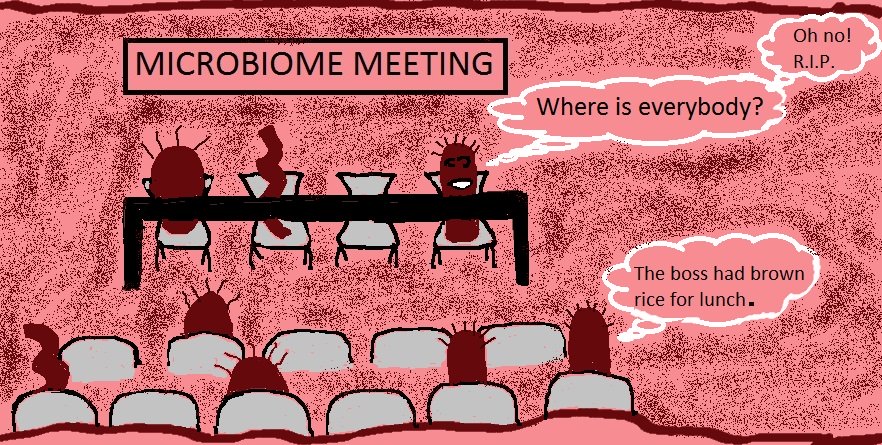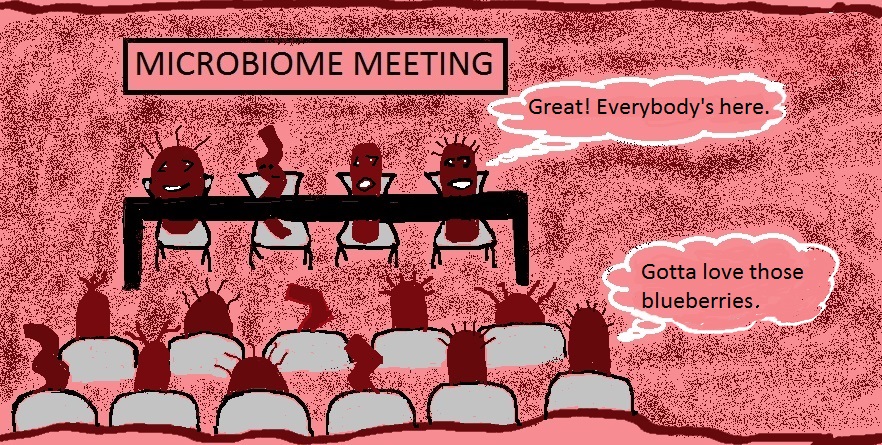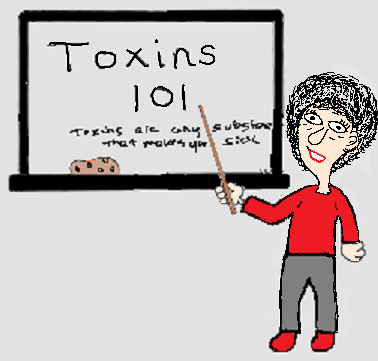- Home
- Toxic Chemicals & Health
- Gut Health
Gut Health
Gut Health is vital to your overall health. But there are many things that can mess with your gut, including toxins like arsenic and pesticides found in the food you eat. There are steps you can take to restore and protect your gut health.
Your Gut
Your gut does a lot more than just digest food and take up a huge amount of space in your abdomen. It is now recognized as a key part of your overall health.
Your gut plays a major role in the production of vitamins, enzymes, and other compounds that digest and metabolize food and regulate your immune system.
It also helps your body detoxify toxins. While the breakdown of toxins in your body mainly happens in your liver, the microorganisms that live in your gut also metabolize some toxins into forms that your body can excrete.
It’s role in breaking down toxins is crucial because your gut can breakdown many compounds in ways that the rest of your detox system can’t.
Your gut also plays a gatekeeper role (gut permeability), allowing good things to pass through into your body while locking up bad things. Maintaining the right amount of permeability of your gut is an important part of your overall health.
For example, too much permeability allows gut-derived bacteria and toxins to infiltrate your bloodstream. And that is not a good thing.
The foundation of all these important functions are the trillions of microorganisms (microbiota) that live in your esophagus, stomach, small and large intestine, called the microbiome.
Your Gut Microbiome
According to data from the Human Microbiome Project, a healthy GI microbiome contains between 70–100 known bacterial species. But there could be as many as a 1,000 different species!
While this species diversity is important, so is having the right proportions of the different kinds in your gut.
A healthy microbiome is dominated by the phyla Firmicutes and Bacteroidetes, followed distantly by Actinobacteria and Verrucomicrobia. Firmicutes and Bacteroidetes are the predominant phyla in the large intestine.
The phylum Proteobacteria accounts for only a small proportion of GI bacteria in healthy people. But, if you suffer from a GI disease Proteobacteria are often found in higher amounts.
Besides the number and types of microbiota, a healthy gut microbiome also includes classes of microbes that enhance your metabolism, endocrine signaling, and brain function, protect you against weight gain, provide protection against infection and inflammation, cancer and autoimmunity.
Gut Health And Disease
Your gut’s microbiota is similar to an organ in that it performs functions essential for your survival. So it makes sense that anything that disturbs how your gut functions can make you sick.
And there's plenty of research to back that up. Over the past decade mounting evidence indicates that changes in the composition of your gut microbiome contributes to a variety of diseases, including diabetes, obesity, cardiovascular diseases, allergies, inflammatory bowel disease, liver disease and cancer and colon cancer.
Unfortunately, that delicate balance of many different kinds of microorganisms in your gut can be easily disturbed.
Messing With Your Gut Health
One of the many things researchers are discovering in the thousands of studies that are done every year on gut microbiota is that many things can mess with these little guys.
And by mess I mean reduce the number and diversity of different microbes, and the ratios of the different types.
I’m sure you know that taking antibiotics and stress can wreak havoc on your gut. So can a lack of physical activity.
Your gut health, like soooooo many other things, also declines as you get older. It becomes less efficient at protecting you from inflammation and its immune functions decline.
That's because as you age the proportions of bifidobacteria, Faecalibacterium prausnitzii, and multiple members of the Firmicutes typically decrease, whereas proportions of E coli, other members of the Proteobacteria, and Staphylococcus often increase.
Your diet, including the toxins that are found in the food you eat, can also disrupt your microbiome.
Diet
Studies suggest that having lots of different kinds of bacteria in your gut contributes to how efficiently your cells process and store food. On the other hand, what you eat can really affect the composition of your microbiome.
If you eat a typical Western diet, high in animal fat, sugar and protein and low in fiber, your microbiome will be different than someone eating a non-Western plant-based diet. Because your diet will be feeding the bacteria that deal with fat.
A plant-based diet, on the other hand, will support bacteria that are dietary fiber fermenters. Researchers are just beginning to figure out what these differences mean for your health.
It's believed that Western diets result in higher levels of the types of bacteria that can cause inflammation and disease, while non-Western diets create a more diverse gut microbiome composition that may protect your health.
For example, studies on the affects of a Western diet found it increases levels of Bilophila wadsworthia, a bacteria thought to cause inflammatory bowel disease. It also increases the abundance of Firmicutes, associated with obesity.
Toxins
Many of the toxins you’re exposed to are found in your food and water. That means you eat them and they pass through your gut. Where they can harm your gut microbiota.
Researchers are beginning to discover that exposure to some ingested toxins, including arsenic, changes your microbiome. Besides arsenic, heavy metals like mercury, pesticides, PAHs (polycyclic aromatic hydrocarbons) and antimicrobial chemicals can and do mess with your gut health.
Although studies of the impact of toxic chemical exposure on your gut microbiome are limited, the information available indicates that they can change the types, number and function of your microbiome.
For example, low-dose exposure to chloripyrifos (an organophosphate insecticide) is associated with a decrease in the beneficial probiotic Lactobacillus spp. and Bifidobacterium spp.
And researchers have found that exposure to arsenic can change both the types of microbiota and how they function in your gut.
These studies are finding that exposure not only alters your gut microbiome community at the abundance level, but also greatly disturbs how your gut metabolizes this toxin.
In other words, your gut protects you from arsenic by breaking it down. But exposure can make your gut less efficient at detoxing. This may make you more vulnerable to not only arsenic, but other types of toxin exposure.
And think about this, many of the chemicals that you’re exposed to are antibacterial in their action. For example, parabens, sulfites, nitrites, nitrates, and many phenols are preservative agents that are present in foods, cosmetics, and cleaning supplies. They are designed to kill microbes.
An example is triclosan, an antibacterial agent that was (most companies have stopped using it) commonly used in soaps, deodorants, toothpaste and mouthwash. Researchers found that triclosan exposure changes both the composition of your microbiome and the way microbial communities interact in your gut.
Toxins That Mess With Your Microbiome
|
Arsenic |
Diazinon |
Mercury |
PAH |
|
Chloripyrifos |
Glyphosate |
Nanosilver |
Triclosan |
Restore Your Gut Health
You can't stop the aging process or refuse to take a course of antibiotics your doctor prescribes. But there are lots of things you can do to restore and protect your gut health. And what you eat is at the top of the list.
Making the following changes to your diet will support microbiota diversity and reduce your exposure to the toxins in food and water that disrupt your gut health. Becoming more active also helps.
Diet Changes Your Gut Will Love
1. Eat Your Fiber
Adding more fiber from fruits, vegetables and beans and reducing animal fats can significantly promote beneficial groups of bacteria and reduce toxin-producers that contribute to inflammation and disease.
So consider becoming a Flexitarian - someone who eats mostly plant-based foods, but occasionally eats meat, poultry and fish. With the exception of never eating red meat and only occasionally eating fish and fowl - this is the type of diet I follow. This approach to healthy eating is the central theme of the Mediterranean Diet.
For gut healthy recipes I recommend The Well-Fed Microbiome Cookbook.
2. Go Organic
Chloripyrifos, diazinon and glyphosate are common agricultural pesticides. That means residues of these microbiome messing pesticides can be found on your produce.
So, to reap all the gut benefits of adding more fruits and veggies to your diet, go organic. Especially for the dirtiest produce, like apples, celery, spinach and berries.
"Glyphosate is also the active ingredient in weed killers like Round-Up. Your gut health is just one of many reasons you should avoid this herbicide. Give natural weed control a try."
3. Cut Back on Brown Rice
Arsenic and mercury levels are often high in brown rice and food made with brown rice, like crackers and pasta. So protect your gut by reducing the amount of brown rice you eat.
- Substitute low-arsenic grains like farro, barley, couscous and bulgur wheat.
- Instead of rice milk give almond milk a try
- Read the labels on energy bars, drinks and baked goods. Avoid the products made with brown rice syrup.
- If you're on a gluten-free diet, consider amaranth, buckwheat, millet, quinoa, oats, cornmeal, grits and polenta. And
- Cut back on the amount of rice-based pastas, breads and crackers you eat.
4. Switch To Low Mercury Fish
Some types of fish contain a lot of mercury. According to the National Resources Defense Council (NRDC), Mackerel (King), Marlin, Orange Roughy, Shark, Swordfish, Tilefish, and Bigeye and Ahi Tuna have the highest levels.
To restore and protect your gut switch to low mercury fish like crab, haddock and Tilapia. For more lower mercury options download the NRDC’s Mercury in fish wallet card here.
5. Eat More Blueberries
Blueberries are a well known source of antioxidants in your diet. Turns out they're also good for your gut. They promote gut health by increasing beneficial bacteria like Bifidobacteria and decreasing inflammation.
Not just any blueberries though. Studies have found that wild lowbush blueberries are the best kind to eat to restore gut health.
So eat them fresh, frozen, dried or powdered. The less commonly known Bilberries (Vaccinium myrtillus L.), which are closely related to blueberries, are also good for your gut.
6. Add Probiotics
A number of studies have established the benefits of probiotics. Probiotics support your gut diversity and help balance your good and bad bacteria maintain your gut barrier and immune functions.
So add probiotic-rich foods to your diet, like live-culture yogurt, sauerkraut, dark chocolate, miso soup, pickles and tempe.
Probiotic supplements are also an option. If you're healthy they're usually safe to take.
But there's a lot that isn't known about these supplements. Like what strains and combinations are best for what conditions. And I'm not sure why you would need to take probiotic supplements every day.
I like to protect my gut through diet and only occasionally take a probiotic when I'm experiencing a digestive issue.
7. Grill Less and Safely
PAHs (polycyclic aromatic hydrocarbons) are formed in foods prepared by smoking or grilling/barbecuing. When you cook meat over an open flame, fat and meat juices often drip onto the fire. This contaminates the flames with many PAHs that coat the surface of the food you’re grilling.
PAHs are broken down in your gut. But, this process creates break down products that are toxic to your gut microbiome.
To reduce your exposure to PAHs cut back on grilled food and when you do grill, keep fat and juices from dripping onto open flames and hot grill surfaces.
8. Filter Your Drinking Water
All the toxins known to mess with your gut health, like arsenic, mercury and pesticides, may be found in your drinking water. So it’s really important to use a good filtering system.
And I’m not talking about a plastic pitcher with a plastic filter that only removes a few things from your drinking water, Invest in the best filtering system you can afford.
I keep it simple with the Big Berkey countertop filter. I like this system because it removes a lot of different toxins and it’s stainless steel.
Get Moving
Diet and exercise are key ingredients of good health. And new research indicates that exercise is important to good gut health, both directly and indirectly.
A 2017 study found that active women have higher levels of health-promoting bacterial species, including Faecalibacterium prausnitzii, Roseburia hominis and Akkermansia muciniphila.
Indirectly, exercise can protect your gut health by helping you maintain a healthy weight. This is important because obesity and body fat are associated with reduced Bacteroidetes and more gut inflammation.
So get moving every day. Find something you like to do and make physical activity a habit.
The food you eat and the toxins in that food can damage your gut health. And the health of your gut affects your overall health. You can protect and restore your gut health with some simple changes to your diet.








